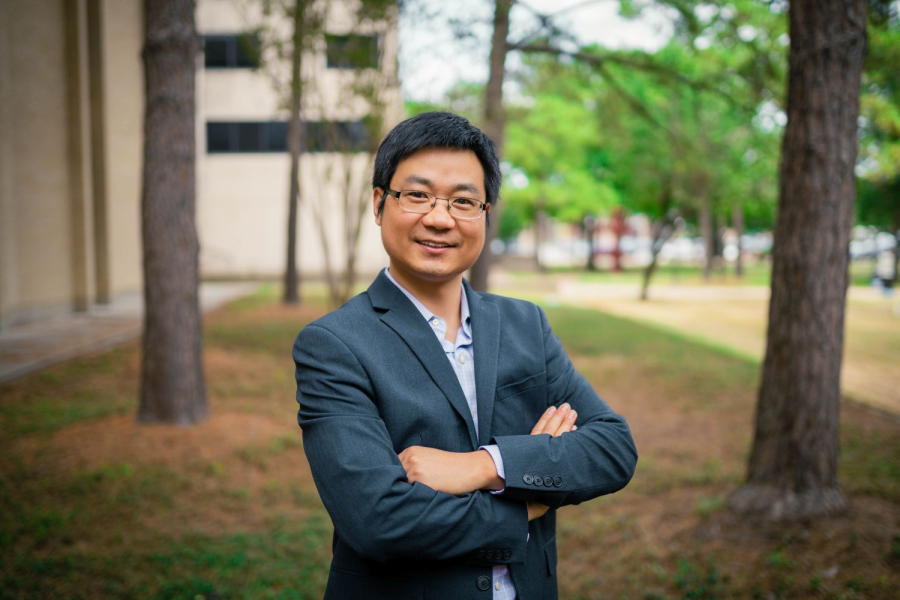Imagine owning a wearable sensor that can monitor your health at every moment in real-time and potentially detect certain cancers in your body before they start affecting you. Through a HEALTH-RCMI Pilot Program Award, University of Houston’s Zhengwei Li will develop a wearable biosensor that promises to detect colorectal cancer and provide real-time health monitoring through your smartphone.
“I hope to make some wearable electronic device to detect cancer which will then connect to our smartphones,” Li said. “We can make this device to help all under-represented communities, so they can have access. Ultimately, we can reduce the health disparities. I hope that this device will be accessible to every family.”
Through support from HEALTH-RCMI, Li has spearheaded a new study, "Development of Ultrasensitve Smart Bioelectronic Sensors for Colorectal Cancer Prevention and Health Disparities Reducing among Black Americans." This initiative was funded $50,000 by NIMHD and HEALTH-RCMI [PI: Dr. Ezemenari Obasi].
Li is an assistant professor and Presidential Frontier Faculty Fellow in the Department of Biomedical Engineering at the Cullen College of Engineering. His innovative research is supported through a joint appointment at the Tilman J. Fertitta Family College of Medicine at the University of Houston.
What deeply resonates with Li is the opportunity to use his biomedical expertise to improve oncology outcomes in marginalized communities. According to the American Cancer Society, colorectal cancer disproportionately impacts the African American community. African Americans are 20 percent more likely to get colorectal cancer and about 40 percent more likely to die from it than other groups.
“Colorectal cancer is the third cause of cancer related deaths in the U.S., according to the American Cancer Society,” Li said. “They estimate more than 150,000 cases this year in the U.S. Black Americans and minorities are more likely to be impacted by colorectal cancer.”
Li’s vision about a cancer-free world is an ambitious one. He is determined to reduce cancer disparities by creating devices that can remotely sense the biophysical signals of certain cancers.
“There are physical biomarkers about colorectal cancer, such as tissue stiffness,” Li explained. “With colorectal cancer, the tumor tissue has higher stiffness than normal tissues, so it is important to get biophysical signaling, such as tissue stiffness. My expertise focuses on creating devices so that gives me an opportunity to use this tool to gather biophysical signaling so to study this important research topic. We can use this tool for the diagnosis, and this sensor can be used to detect this biomarker signaling.”
Notably experienced in the development of new mobile sensors, Li has previously achieved a few milestones in the sphere of cancer detection. Through the crucial support of two department chairs, Li credits the insight and guidance of John S. Dunn Endowed Chairman Metin Akay from Biomedical Engineering Department in the Cullen College of Engineering, and professor and chairman Kevin Rowland from Biomedical Sciences Department in College of Medicine.
“In the previous project, we used a skin type sensor that we put on the skin to quantitatively get a hydration level of the skin by using the smartphone to read the hydration level,” Li said. “I’m inspired by this work, so I want to make wearable electronic devices for cancer detection.”
Li plans to broaden the scope of his research to include the early detection of other cancers.
"Colorectal cancer is such a deadly cancer,” Li said. “My research in this area may provide some solutions for early detection. I hope to make some wearable devices--not only for colorectal cancer but also for the other types of cancer, like breast cancer and other types of cancer. I hope it will be accessible to every family—to reduce the health disparities among the minority populations.”
If you would like more information about this topic, please contact Alison Medley at 713.320.0933, or email aemedle2 [at] central.uh.edu (aemedle2[at]central[dot]uh[dot]edu).
